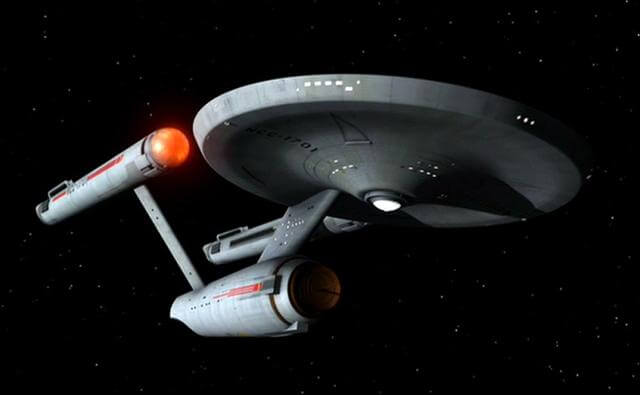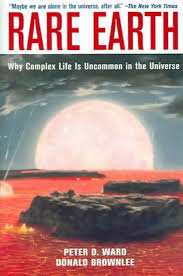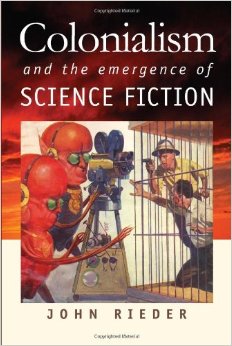Ricochet is the best place on the internet to discuss the issues of the day, either through commenting on posts or writing your own for our active and dynamic community in a fully moderated environment. In addition, the Ricochet Audio Network offers over 50 original podcasts with new episodes released every day.
 The Death of the Space Opera?
The Death of the Space Opera?
 Has anyone else out there noticed that one of the staples of science fiction in the serial visual entertainment medium until recently known as television and the dying form of the motion picture, the Space Opera, is — how to put this delicately — older than grandpa’s snuff? To be less delicate, if the Scripted Visual Media Space Opera were a humanoid (let’s not be speciesist), it would be looking for its second duranium hip replacement and popping kidney regeneration pills like they were candy. Bendii syndrome could not more than 20 years off, at the outside.
Has anyone else out there noticed that one of the staples of science fiction in the serial visual entertainment medium until recently known as television and the dying form of the motion picture, the Space Opera, is — how to put this delicately — older than grandpa’s snuff? To be less delicate, if the Scripted Visual Media Space Opera were a humanoid (let’s not be speciesist), it would be looking for its second duranium hip replacement and popping kidney regeneration pills like they were candy. Bendii syndrome could not more than 20 years off, at the outside.
If we just look at the some of the genre’s best-known representatives for a minute, we find that there are at present, a “new” iteration of the Star Wars (date of birth, 1976) films and a “new” Star Trek (date of birth, 1964/66, depending on when you start counting) film in the works. The franchises are, in movie/TV terms, antiquated, and both of these original franchises are themselves derivative from even earlier models of visual-medium SF, the Buck Rogers and Flash Gordon serials of the 1940’s.
This summer movie houses were dominated by Guardians of the Galaxy, which is a film version of a 1970’s comic book written to cash in on the success of the original Star Wars, which means that its source material is not exactly Young Republicans material, either. Battlestar Galactica? Again, its origins are in the attempts of television writers and executives to cash in the success of Star Wars and the 1970’s pop-culture obsessions with “ancient astronauts” (don’t suppose the name “von Däniken” rings a bell?). Japan’s successful 2010 revival of Space Battleship Yamato was also a revival of a property nearly 40 years old.
My wife and I were talking about this over a coffee porter and we quickly came up with a list of “newer” Space Operas that had been successful enough to have penetrated — at least a little — outside of nerd culture: Babylon Five; Stargate, which also derives its key plot conceit from the Erich von Däniken craze of the 1970’s; Farscape; and Firefly, which only got in by dint of the determination of its fans. The youngest of these, Firefly, is now over ten years old. None of them is currently in production as a regular series, either.
What about Dr. Who, you ask? It strains the definition of Space Opera, it’s central conceit being time travel, not space travel per se. And if I were to grant it for the sake of argument, it would just be one more example of a dated franchise chugging on into the present day.
What has been recently been in production in the film/tv sci-fi world? The Walking Dead; Fringe; Warehouse 13; Z Nation; handful of superhero shows on Warner Brothers’ network that act as feeders for its coming movie series. Ten years ago, the scene was entirely different, with the series named above all in production or in heavy syndication.
So what happened? Is the Space Opera dead? If so, what killed it?
Scientific Discoveries
It’s Kepler’s fault. No not the Protestant father of modern astronomy, talented layman in religious matters who occasionally dabbled in theology, defender of a heliocentric view of the solar system and discoverer of the laws of planetary motion that now bear his name. Not Hans. But the space telescope that was named after him. Since its launch in March, 2009, the Kepler Space Telescope has discovered 1,763 planets in orbit of stars other than our sun. In these five years and seven months, there have been repeated discoveries of so-called “Super-Earths” and “Earth Twins” that have, on further examination have proven — as far as the received data can tell — to be completely uninhabitable. Which is distressing, since the telescope’s mission statement was to:
- Determine the abundance of terrestrial and larger planets in or near the habitable zone of a wide variety of stars;
- Determine the distribution of sizes and shapes of the orbits of these planets;
The findings so far are summarized briefly in a paragraph on the mission statement, with the key sentences being:
There is now clear evidence for substantial numbers of three types of exoplanets; gas giants, hot-super-Earths in short period orbits, and ice giants.
 For the Space Opera question, the important category of planets discovered is: hot super-Earths. Not habitable planets, but rocky planets 1.25 times the size of earth and larger that have orbital characteristics that exclude them as candidates for possible abodes of life. That is to say, each new Kepler discovery since 2009 has only served to strengthen the ‘Rare Earth’ Hypothesis put forth by Ward and Brownlee in the book of that title.
For the Space Opera question, the important category of planets discovered is: hot super-Earths. Not habitable planets, but rocky planets 1.25 times the size of earth and larger that have orbital characteristics that exclude them as candidates for possible abodes of life. That is to say, each new Kepler discovery since 2009 has only served to strengthen the ‘Rare Earth’ Hypothesis put forth by Ward and Brownlee in the book of that title.
Now, science fiction worth the name is always downstream from science. When Gene Roddenberry conceived of Star Trek and Glen Larson first thought up Battlestar Galactica, it was still possible to imagine that there were hundreds of habitable worlds out there waiting to be discovered. It was also still possible to think that there might be ways to engineer supra-luminal travel that could credibly leave the passengers on a supra-luminal space vehicle alive (c.f. Dan Simmons’ idea of ‘raspberry jam speed’). And, no, the Alcubierra Warp Drive does not work without positing the existence of Impossibilium, by which I mean some form of exotic matter that has the ability to bend space time in such a way as to enable a vessel with human passengers and crew to traverse interstellar distances in human lifetimes.
Maybe, after a century of revolutionary technological changes in the maximum travel speeds available to humans, we have hit a limit that we can never exceed and the popular imagination is only now catching up with that fact. Larry Niven has posited that there were two basic preconditions for stories involving galactic civilizations, of which Space Operas are a sub-set: 1) economically feasible, reliable, faster-than-light travel and 2) the existence of multiple habitable planets. At the moment, it looks like science speaks against the former being possible and the latter existing. The sinking of that realization into the public imagination may be one explanation.
Cultural Pessimism
 One other key element to stories involving galactic empires that Niven failed to mention is that the civilizations on other worlds and ours would have to want to build empires. Or maybe Republics; at least least Federations. A civilization must have some cultural drive to expand and plant itself on new territory in order for us to have a Space Opera, pitting the brave heroes of, say, New Texas, against the rapacious inhuman monsters from Chl’zhul’hagz’va’dozha. Or at least pitting them against the cyborg goons serving the Master Bureaucrat of The Beltway Collective.
One other key element to stories involving galactic empires that Niven failed to mention is that the civilizations on other worlds and ours would have to want to build empires. Or maybe Republics; at least least Federations. A civilization must have some cultural drive to expand and plant itself on new territory in order for us to have a Space Opera, pitting the brave heroes of, say, New Texas, against the rapacious inhuman monsters from Chl’zhul’hagz’va’dozha. Or at least pitting them against the cyborg goons serving the Master Bureaucrat of The Beltway Collective.
In the U.S. and the West in general, we’ve come to denounce that drive to expand and conquer as uncouth imperialism and colonialism. We are not supposed to want to set up shop on the marsh-world inhabited by primitive spear-wielding frog people much less want to draw them into our cultural sphere. And that mentality, common to cultural studies and literary theory, has had its tentacles in lit crit dealing with science fiction for years. A case in point would be Colonialism and the Emergence of Science Fiction, by John Rieder. See also Black in Space: Imagining Race in Science Fiction Film, Science Fiction, Imperialism and The Third World, and, for a very quick read, this piece from the Atlantic.
Rather than glorify or re-imagine the 19th Century imperialist legacy, newer film sci-fi has tended toward attacks on that legacy and the body of thought that drove it, a la Avatar or District 9, or to focus inward and use expansion into space as an expression of class warfare, as in Elysium. This seems only to reflect the inculcation of a mindset skeptical of the kind of civilizational confidence that was the soul of earlier generations of science fiction. The thought that the culture who brought classical liberal democracy and capitalism to the world should continue that project beyond our planet is one that a generation raised on distillates of Foucault, Althusser, Derrida, and Said simply can’t take seriously. No, they can’t even abide it in their sci-fi, one of the most escapist of film and television genres.
One Too Many Trips to the Well
There is a much more prosaic explanation for the absence of new space operas in the last decade: fatigue. The period from the mid-1990s to 2009 saw all of the series referenced in this essay rise, reach their respective apexes, and end their production runs. That’s a total of six major space opera franchises that were competing for their slice of the target audience’s leisure time and attention for a most of two decades. Perhaps the target audience has simply grown bored with the genre or comfortable with the exponents of the genre they have grown up with and is unwilling to admit new explorations of the theme.
That said, Star Trek and Star Wars still sell tickets and so they will chug on and suck up oxygen (money, time) from any new property that might be developed. This may be the best explanation, but it’s certainly the dullest. I’d like to think that what people imagine their future could — or ought to — be provides some insight the aspirations that their culture is engendering in them. The lack of new space operas can be read as a troubling sign of cultural pessimism, while the unwillingness to part with the “legacy” Space Operas of Star Trek and Star Wars can be read a wistful desire to hold on to the fundamentally optimistic view of life that underpins them.
Now, your turn. Is the Space Opera dead in story-driven visual media or not? And, yes, I have deliberately excluded online gaming from this discussion, focusing only on scripted media with defined storylines unchangeable by the viewers. Of these three explanations, which do you find most convincing? Do you have another?
Published in Culture, General



This illustrates a weakness in the copyright laws, IMHO. How a novel can be public domain, but the characters in the novel are not public domain, is beyond me.
I blame Disney. And the Federal government which loves to make convoluted copyright laws to placate big money donors like Disney.
Copyright laws are a mess, and there’s no obvious conservative solution. Property owners’ rights must be respected–after all, if your family has owned a house for 120 years, it doesn’t mean that it’s community property; but common sense suggests that if Robin Hood and Huckleberry Finn are public domain, then at some point Mickey Mouse and Rhett Butler will be, too. Hollywood lawyers are adept at pushing that date farther and farther into the future, but patent lawyers taught them these tricks when the movies were still in the nickelodeon stage.
I have not, but I’ll pick it up.
Well if you’re going to use facts and logic to destroy my poorly-founded blame-casting …
Yeah, the laws are a serious mess. A lot of it seems to center on how motivated the original creator was to jealously protect their work. Margaret Mitchell was pretty protective, enough that she sued Al Capp when he attempted a parody in the Sunday “Lil’ Abner” series. Disney has kept a vice grip on its properties.
Coincidentally, I was just listening to an episode of Jago and Litefoot (“The Monstrous Menagerie”) which featured Arthur Conan Doyle, annoyed by fans wanting him to write more Holmes stories. He ends up in an adventure that features dinosaurs and time travel, which we are meant to take as his inspiration for The Lost World. But due to plot circumstances, he must also promise to write The Hound of the Baskervilles.
An interesting case is the Bond series. “Thunderball” was originally co-written with an American to be sold to CBS in 1959, but instead became the fourth James Bond feature film. The co-author, Kevin McClory, successfully sued and was able to sell the rights to Sean Connery’s team to do a semi-remake called “Never Say Never Again”. They got away with it, as they were entitled to–but Eon Productions (Bond central) made sure the adapters could use only the characters actually in Thunderball; no peripheral characters who weren’t mentioned in 1959. “Never Say Never Again” Even had to pay damages for the use of Blofeld’s cat, which in an overlooked detail was never part of the original story